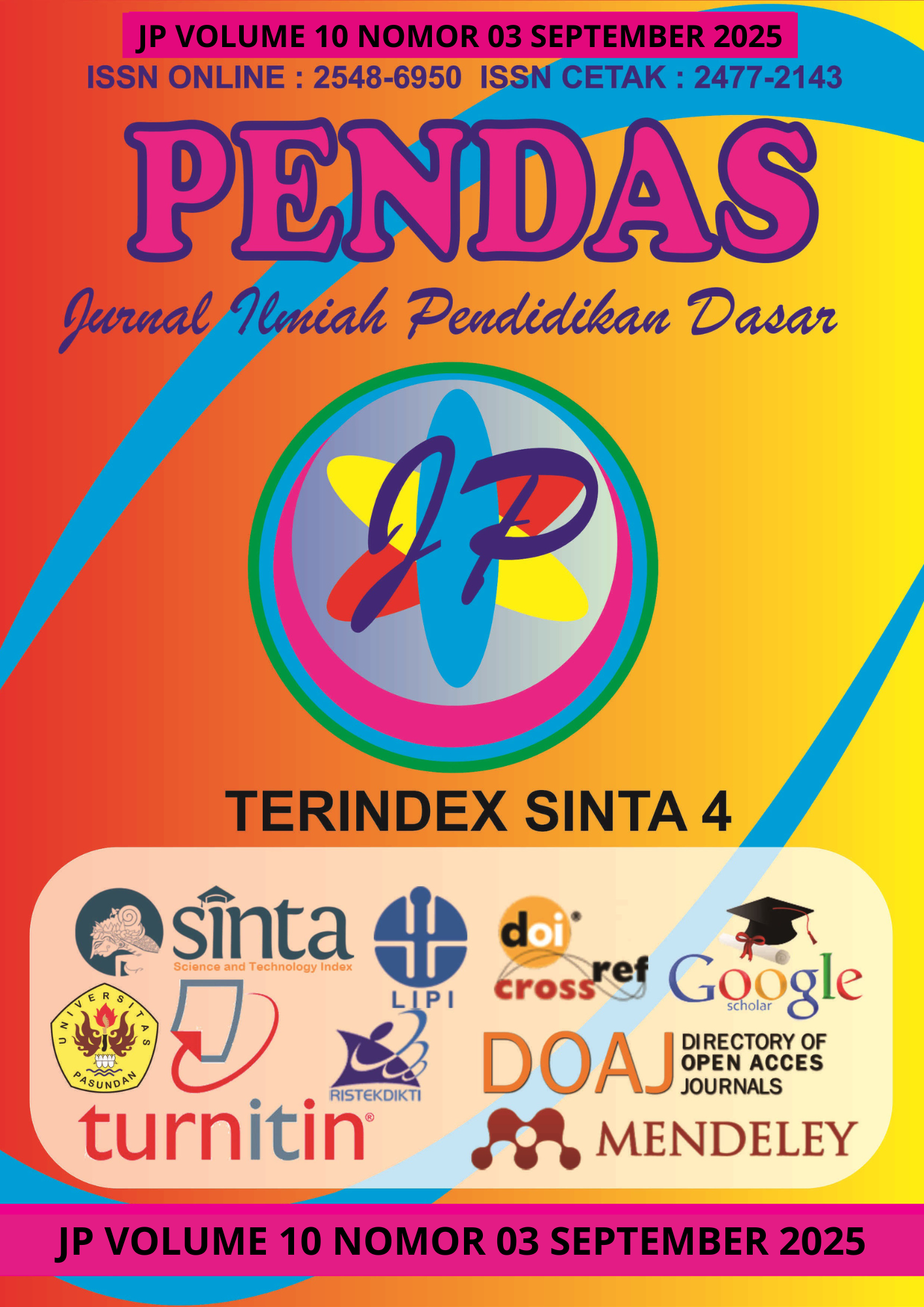MANAJEMEN PEMBELAJARAN BERDIFERENSIASI DALAM MENINGKATKAN HASIL BELAJAR IPAS DI SEKOLAH DASAR KABUPATEN CIANJUR
DOI:
https://doi.org/10.23969/jp.v10i3.28535Keywords:
learning outcomes, learning management, differentiated learningAbstract
This research analyzes the implementation of differentiated learning management to improve learning outcomes in Science, Social Studies, and Arts (IPAS) for fifth-grade elementary school students in Cianjur Regency. The background for this study is the importance of learning that accommodates the diverse characteristics of students, in line with the Merdeka Curriculum, which emphasizes a differentiated approach and holistically considers student wellbeing. Studies on differentiated learning management within the context of IPAS and its relationship to improving learning outcomes and student wellbeing in elementary schools are still limited. This research aims to uncover the role of structured and contextual differentiated learning management in improving IPAS learning outcomes, as well as its contribution to a learning environment that supports students' emotional and academic welfare. Using a qualitative method with a case study approach, data was collected through observation, in-depth interviews, and documentation. Data analysis was conducted in stages and interactively, including data reduction, data presentation, and conclusion drawing. The research findings indicate that effective differentiated learning management can enhance active participation, conceptual understanding, and academic achievement of students in IPAS. This approach also contributes positively to student wellbeing, as evidenced by an increase in self-confidence, independence, and learning satisfaction.
Downloads
References
Agustin, M, & Syaodih. (2008). Bimbi-ngan konseling untuk anak usia dini. Jakarta: Universitas Terbuka.
Anderson, L. W., & Krathwohl, D. R. (2001). A taxonomy for learning, teaching, and assessing: A revision of Bloom's taxonomy of educational objectives. New York: Longman.
Bear, G. G. (2010). School discipline and self-discipline: A practical guide to promoting prosocial student behavior. New York: Guilford Press.
Borich, G. D. (2014). Effective teaching methods: Research-based practice (8th ed.). Boston: Pearson Education.
Guskey, T. R. (2002). Professional development and teacher change. Teachers and Teaching: Theory and Practice, 8(3), 381–391. https://doi.org/10.1080/135406002100000512
Hall, T., Strangman, N., & Meyer, A. (2003). Differentiated instruction and implications for UDL implementation. National Center on Accessing the General Curriculum. Retrieved from http://aem.cast.org/
Kementerian Pendidikan dan Kebudayaan Republik Indonesia. (2020). Panduan pembelajaran berdiferensiasi. Jakarta: Direktorat Jenderal Guru dan Tenaga Kependidikan.
Kurniasih, I., & Sani, B. (2017). Ragam pendekatan pembelajaran abad 21. Bandung: Alfabeta.
Permendikbudristek No. 53 Tahun 2023 tentang Penjaminan Mutu Pendidikan Tinggi. (2023). Jakarta: Kementerian Pendidikan, Kebudayaan, Riset, dan Teknologi Republik Indonesia.
Robbins, S. P., & Coulter, M. (2012). Management (11th ed.). Boston: Pearson Education.
Sousa, D. A., & Tomlinson, C. A. (2011). Differentiation and the brain: How neuroscience supports the learner-friendly classroom. Bloomington, IN: Solution Tree Press.
Terry, G. R. (1977). Principles of management (6th ed.). Homewood, IL: Richard D. Irwin.
Tomlinson, C. A. (2014). The differentiated classroom: Responding to the needs of all learners (2nd ed.). Alexandria, VA: ASCD.
Undang-Undang Republik Indonesia Nomor 20 Tahun 2003 tentang Sistem Pendidikan Nasional. (2003). Lembaran Negara Republik Indonesia Tahun 2003 Nomor 78. Jakarta: Sekretariat Negara.
UNESCO. (2020). Education for Sustainable Development: A roadmap. Paris: UNESCO Publishing.
Uno, H. B. (2016). Teori motivasi dan pengukurannya. Jakarta: Bumi Aksara.
Winataputra, U. S. (2017). Manajemen pendidikan: Suatu pengantar praktis. Jakarta: Universitas Terbuka.
Zins, J. E., Weissberg, R. P., Wang, M. C., & Walberg, H. J. (2004). Building academic success on social and emotional learning: What does the research say? New York: Teachers College Press.
Downloads
Published
Issue
Section
License
Copyright (c) 2025 Pendas : Jurnal Ilmiah Pendidikan Dasar

This work is licensed under a Creative Commons Attribution 4.0 International License.



















